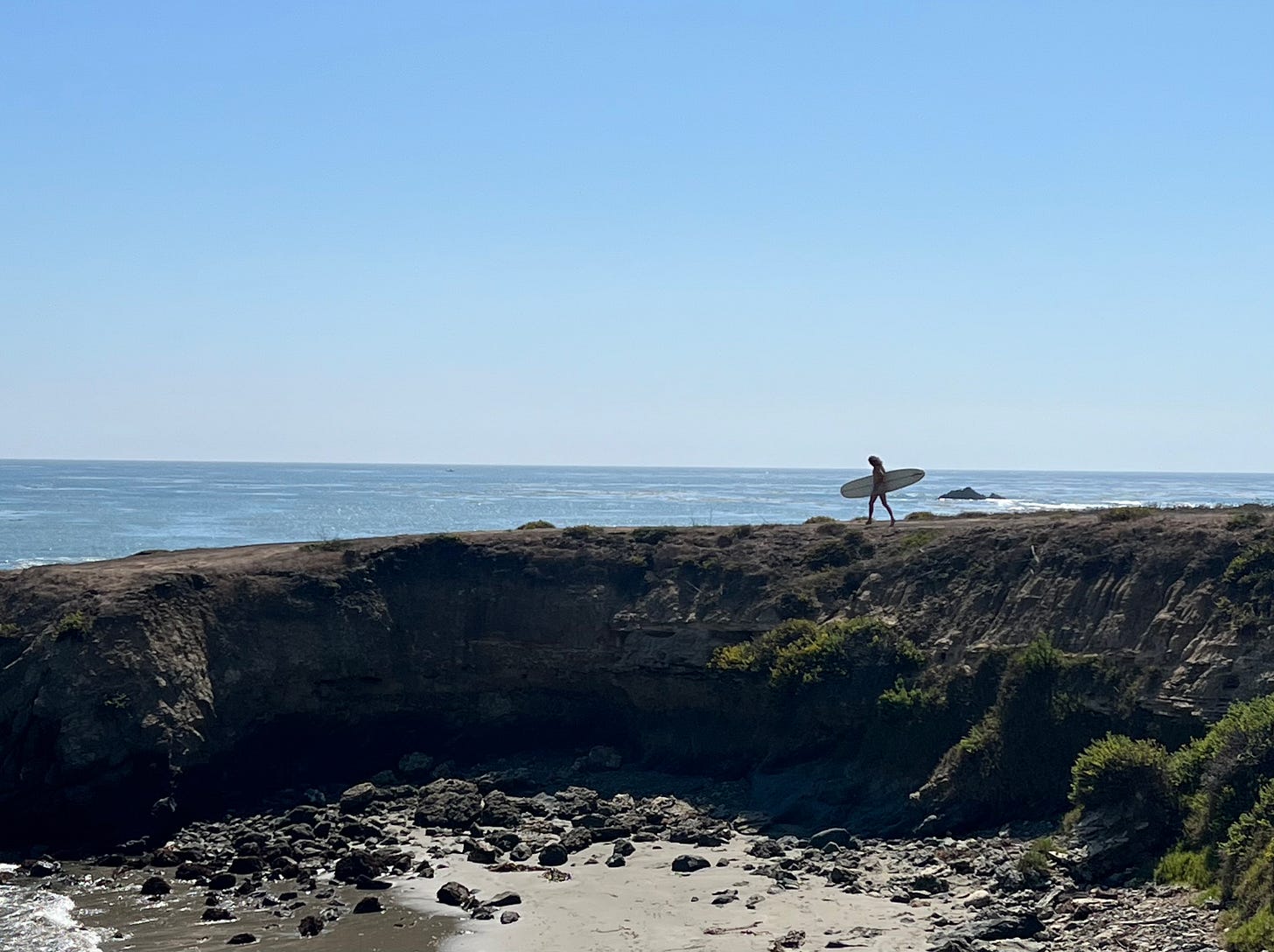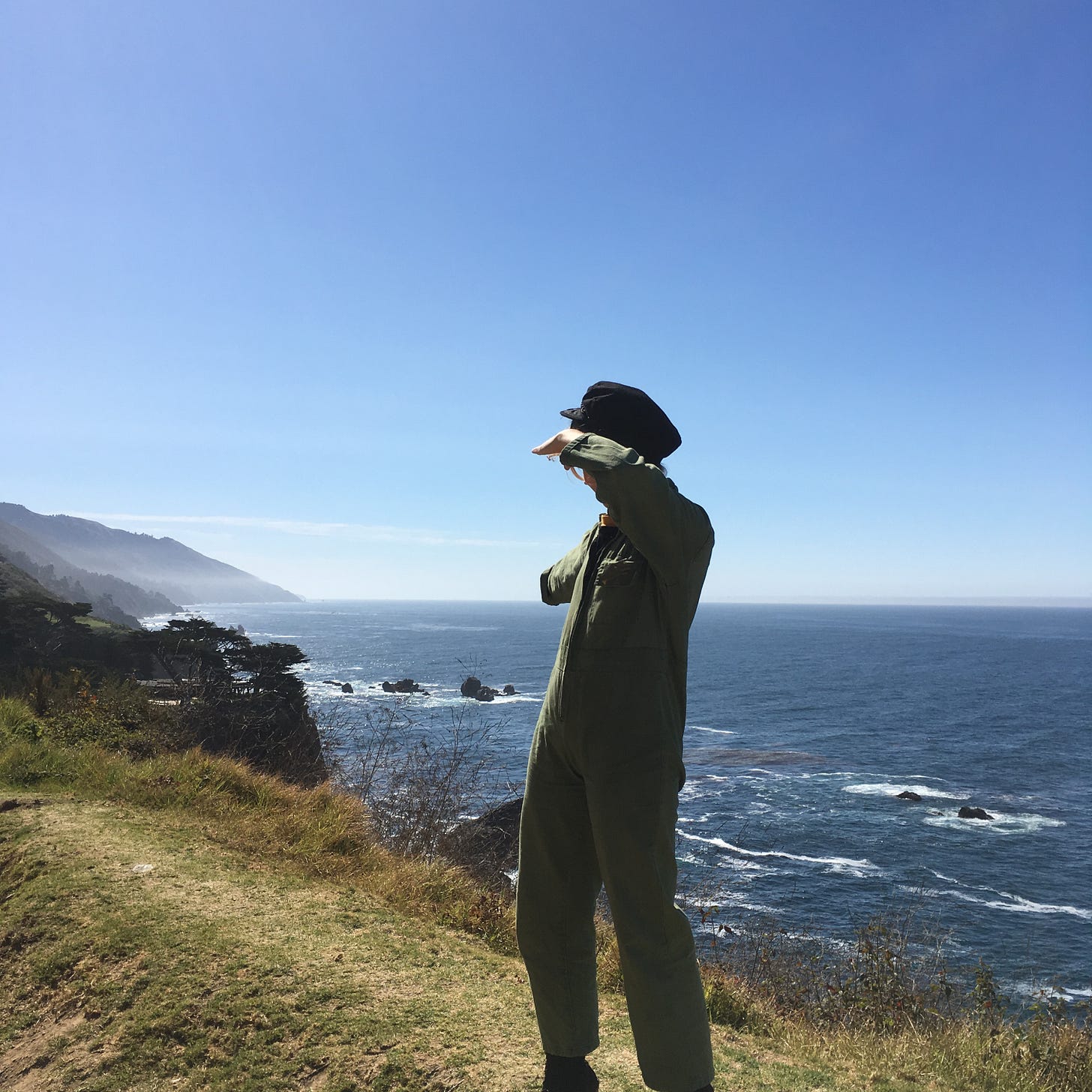
Sometimes when I write, I wonder if people think I arrive at the personal conclusions I share with unshakable resolution. I’m thinking specifically of a drawing I posted to Instagram in May related to feelings of anxiety in relationships and the idea of self-abandonment:
“For a while I was anxious in love and entertained abandonment scenarios in my head often. I think the reason people fear abandonment in relationships is because often it is an act of self-abandonment to calibrate yourself to someone so acutely. I ask myself: How deep is my willingness to find my own satisfaction? How much do I pinch myself off from my inner resources?”
Revisiting something from only a few months ago and noting the past-tense I assigned to feelings that will likely wax and wane over the course of my life is endearing, to say the least. For a while I was anxious in love.
Do I get seduced into delivering a conclusive idea to satisfy my readers, or is it just to convince myself that I’m healed of a burden I’ve long carried? It’s undeniably fulfilling presenting thoughts as persuasive formulas: I used to feel a certain way, then I thought about it differently, I’ve outlined it here, maybe it will help you too. But if a formula is fixed to feelings, feelings that are subject to life’s variables, does it not render the equation infinitely mutable, and therefore kind of irrelevant?
Can I resist the urge for my writing to be result-oriented? Can I give my reflections the grace of a shelf-life, wherein the takeaway looks more like: I like the way this self-discovery feels, I hope I hang onto it, here we go again, maybe.
Lately I wonder if my writing functions less like a message to share with others, and more like a note-to-self stuck on the bathroom mirror or the dashboard in my van. I write something down so that I can return to it again, I leave it up so that I don’t forget.
I’m in a new relationship, and I’m anxious. T. has not had a relationship like this before, and our dynamic challenges me to question and unlearn some of what I’ve picked up from the many that I’ve had. Perhaps the greatest teacher is not one who has been studying for years, but one who comes from an entirely different school.
Last week we went to the cinema, my first time at the movies since Covid. Mistakenly, we hoped we were seeing a Leonard Cohen biopic. There was candid footage of Cohen talking about creativity, buddhism, and persistence, and with delight I could have watched for hours had the whole thing been a reel of his musings. Instead, the film was centered around Cohen’s infamous song “Hallelujah” and how obsessed people are with it. People are very obsessed. I’m not sure I’ll listen to the song again, although without effort I’ve heard it twice already since seeing the film. People, not surprisingly, have taken things too far.
With my permission, T. mixed peanut M&M’s in with my popcorn, and I liked it. He fed me kernels from his own bag during the cringey parts of the film, and otherwise kept an arm or a hand or a leg around me during the good parts. Halfway through I found myself captivated by scenes of Cohen’s relationship with the photographer Dominique Isserman. Old footage shows the two of them walking around a wintry beach scene while Isserman works to take Cohen’s photograph. Her beauty stings. Looking up at the screen, a wall-to-wall sheet of Isserman’s blonde hair, I thought about how lucky Cohen was to feed off of so many muses.
The only people at the film besides us were three women in their late sixties who, on their way out of the theater, marveled that they loved Leonard even more than before, “which was already at an all time high”. One of them noted his influence across generations, a nod to our youth and the visible gap between T. and I, and them. I wanted joke that we didn’t know who Cohen was until that night, that we were just there because of Jeff Buckley or the Shrek soundtrack, but I didn’t.
After the film we drove back up the coast and parked along the highway where I had left my van earlier. Facing a full Aquarius moon, we shared soft kisses in fragmented spotlights from cars that passed by sporadically. T. suggested we sleep in the back of his truck, wake up early, and surf. The invitation was a first. I agreed confidently, but inside I was overwrought with unease for the potential “what if” of sharing such an intimate setting spontaneously.
I wince when I’m reminded of my inclination towards the “escalator relationship,” something I’ve written about before. I don’t like playing into predetermined expectations with someone. I don’t like the possibility that how and when things unfold between people is generally mapped out by social mores. I don’t like that not having had traditional relationships by a certain age is considered a red flag. I don’t like that relational success is often measured by longevity, or that intimacy is gauged through sex.
I’ve learned to differentiate relationships by whether or not sex happens between people and I’ve learned to emphasize the timing and frequency of sex, too. The inclination to simplify our most intimate rituals to quantifiable means seems shared by many; it’s easy to follow suit. But a reduction of relating to others like this frustrates me. It gets into my head and eats away at the offerings scattered around that come from being present, a bounty that can only be seen when I trust the natural pace of each unfolding moment with another human being.
When I’m with another person, I admit that I eventually pick up on what I perceive to be a shared internal rhythm, a mutual feeling of innate timing, but I wonder if this feeling is mere projection. T. and I have been seeing each other for almost two months, and we have not had sex. When I recently shared this with the primary circle of women in my life, the confounded, perplexed, and borderline worried reactions were ubiquitous. One friend suggested that my abstinence might be a sign I’m not ready to date at all.
I’ve waited, perhaps not very patiently, to meet somebody I really like. Now that I’ve met someone, dashing to the finish line is a recurring topic of conversation. Sex is one way I’ve been taught to measure love and security, and so even when there’s nobody around to ask me how things are progressing, I still somehow find a way to overthink it. But are these thoughts really mine? Have I devoted myself to translating my own beliefs and attitudes around sex? What is sex really offering?
Sex is fun and I want to do it. What isn’t fun is the developing concern I’ve observed in myself and others around my not doing it. If I no longer use sex to prematurely feign intimacy, what takes its place? When I reframe “holding out” from sex as holding space for ambivalence, precarity, and listening to myself above all, I can see why it gets uncomfortable to wait. What happens when I try to defy the clock I’ve always lived by?
I don’t think the rush towards sex is about lust or pleasure — lust fades and we can please ourselves. Perhaps it is about the urgency of guarantee. I can conceive of sex as a fortification ritual between myself and another, a promise of sorts, but ultimately I know this is just embroidery. I can’t be certain of anything — I can’t control another person’s direction towards or away from me. Having sex under the guise that it will minimize the risk of loss or banish uncertainty feels like delusion to me. But however false its trappings may be, a sense of security is seductive. It lures us in, often before we are ready.







